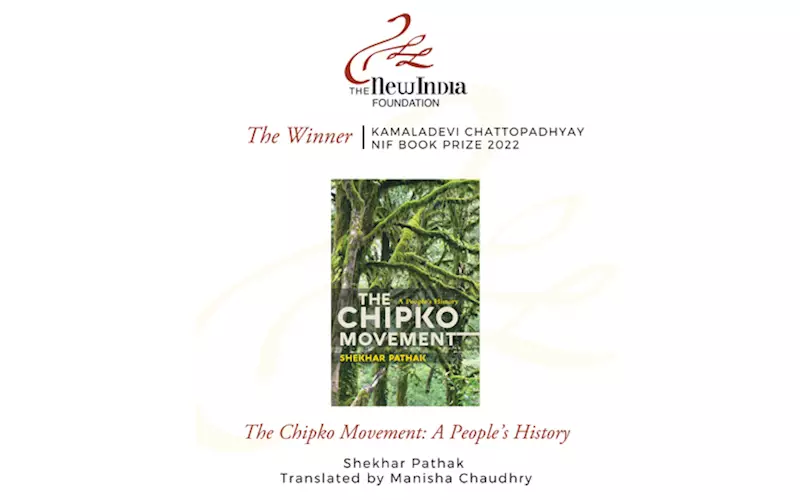Book on Chipko movement wins the Kamaladevi Chattopadhyay NIF Book Prize
The New India Foundation has announced the winner of the Kamaladevi Chattopadhyay NIF Book Prize 2022. The coveted book prize in its fifth edition has been awarded to The Chipko Movement: A People’s Movement by historian, activist, and writer Shekhar Pathak, translated from the Hindi by Manisha Chaudhry. The book was published by Permanent Black and Ashoka University.
02 Dec 2022 | By Dibyajyoti Sarma
The winner was selected from a diverse shortlist of five deeply researched and engagingly written books covering a wide expanse of modern Indian history and encompassing distinct topics and perspectives. The other shortlisted titles included Accidental Feminism: Gender Parity and Selective Mobility Among India’s Professional Elite by Swethaa S Ballakrishnen; Whole Numbers and Half Truths: What Data Can and Cannot Tell Us About Modern India by Rukmini S; Midnight’s Borders: A People’s History of Modern India by Suchitra Vijayan; and Born a Muslim: Some Truths about Islam in India by Ghazala Wahab.
The Kamaladevi Chattopadhyay NIF Book Prize recognises and celebrates excellence in non-fiction writings on contemporary India by writers from all nationalities. The winner receives a cash award of Rs 15 lakh, a trophy and a citation.
The winner was selected by a six-member jury panel including political scientist and author Niraja Gopal Jayal (Chair); entrepreneur Manish Sabharwal; historian and author Srinath Raghavan; historian and author Nayanjot Lahiri; former diplomat and author Navtej Sarna; and attorney and author Rahul Matthan.
The Jury citation for the Kamaladevi Chattopadhyay NIF Book Prize 2022 reads:
This is the definitive history of the Chipko movement by a scholar who has practically lived it. It is fitting that a book that tells the story of a movement through the eyes of the local communities, especially women, should be as readable as this one is. Translated from the Hindi by Manisha Chaudhury, Shekhar Pathak’s book is a salutary reminder of the transformative power of collective action, and not just an important work of history but one that speaks to the contemporary moment and its twin crises of ecology and democracy.
In India, modern environmentalism was inaugurated by the Chipko Movement, which began in 1973. Because it was led by Gandhians, included women participants, occurred in “spiritual” Himalayan regions, and used innovatively non-violent techniques of protest, it attracted international attention.
It also led to a major debate on Indian forest policy and the destructive consequences of commercialisation. Because of Chipko, clear-felling was stopped and India began to pay attention to the needs of an ecological balance which sustained forests and the communities within them. In academic and policy-making circles it fuelled a wider debate on sustainable development — on whether India could afford to imitate the West’s resource-intensive and capital-intensive ways of life.
Chipko’s historians have hitherto focused on its two major leaders, Chandi Prasad Bhatt and Sunderlal Bahuguna. The voices of “subalterns” – ordinary men and women such as Gaura Devi, who made Chipko what it was – have not been recorded. Shekhar Pathak has lived in their valleys, studied the landscapes, talked to protesters and communities, and trawled local newspapers of the time. He shows that in leadership and ideology Chipko was diverse and never a singular Gandhian movement.
Shekhar Pathak has travelled to virtually every hamlet of Kumaon and Garhwal, and his knowledge of the Himalaya is widely acknowledged to be encyclopaedic. He is an indefatigable mountain-walker who has been traversing 1100-km on foot once every decade, starting in the village of Askot on the Nepal border in the east and ending in Arakot in Himachal Pradesh. He established the People’s Association for Himalaya Area Research (PAHAR) in 1983 and is the author, with Uma Bhatt, of Asia ki Peeth Per (On Asia’s Back), a biography of the Himalayan explorer Pandit Nain Singh Rawat. He has published numerous pamphlets and several issues of the journal Pahar over the years. He has also been a professor of History at Kumaun University, Nainital, and Fellow at the Centre for Contemporary Studies, Nehru Memorial Museum and Library, New Delhi. He was awarded the Padma Shri in 2007.











 See All
See All